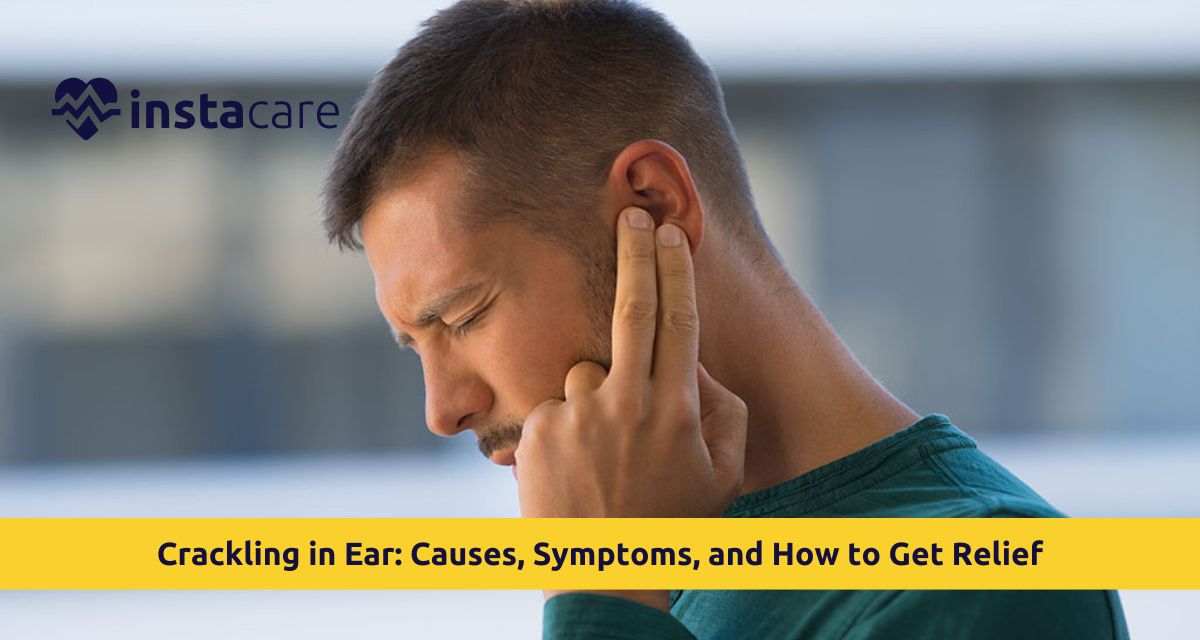What Does Crackling in the Ear Mean?
Common Causes of Crackling in the Ear
- Eustachian Tube Dysfunction: Happens mostly if the tube won't open or shut right. When eustachian tube dysfunction occurs, pressure gets off balance - so you hear popping noises while swallowing, yawning, or moving up in height.
- When wax builds up, it might push on the eardrum - causing odd noises. That lump of dried-out crud shifting around could lead to ear crackling and popping.
- Pressure changes from jaw motion sometimes stir that stuff, making tiny rumbles you hear inside. Stuck wax messes with how sound moves through the passage - so weird echoes happen. Earwax blockage and crackling go hand in hand.
- Fluid in the middle ear can show up after a cold, allergy flare-up, or infection - making popping or fizzing noises when it shifts or presses on inner parts. Sometimes it's clean; other times, it's got an infection brewing.
- Ear troubles: Outer or middle ones bring popping sounds - also hurt, leak stuff, make hearing weird. Germs like bacteria or viruses lead to swelling plus buildup inside with various ear infection symptoms.
- Temporomandibular Joint issues: This hinge near your ear might lead to crackling in ear when moving jaw while chewing, often followed by discomfort around the face or a snapping jaw.
- When you fly, dive, or drive up a mountain, shifts in air pressure might make your ears feel blocked - sometimes they pop or snap while trying to balance out, causing ear congestion and crackling.
- When your nose gets stuffy, it might shut off the eustachian tube - causing ongoing popping sounds. Instead of clearing up fast, that gunk lingers, messing with ear pressure. Swelling from irritation narrows passages, so air can't flow properly. Even after symptoms fade, leftover fluid keeps things crackling.
Associated Symptoms of Crackling in the Ear
- Ears feeling stuffy or like there's weight inside
- Sounds seem quieter or you can't hear well for a while
- Crackling in ear and dizziness - points to something off in the inner ear
- Pain that shifts from slight annoyance to sharp throb
- Tinnitus - noises like ringing, hissing, or humming in the ears
- Ear crackling when yawning or gulp down food
- Fluid leaking from the ear passage
- Fever - often when sickness hits
- Headache or a feeling of tightness in the face
- Balance problems
Diagnosis of Crackling in the Ear
- Physical check: With a small scope, med pros look into your ear to spot infections, extra wax, fluid, or odd shapes inside.
- Hearing checks: audiometry sees if popping noises change how you hear, while also spotting issues in the middle ear.
- Tympanometry checks how the eardrum moves - spotting trapped fluid or issues with air flow using slight pressure changes inside the ear.
- Nasal check: Eustachian tubes link up with the nose area, so looking inside the nostrils can reveal connected problems.
- Imaging: Now and then, a CT scan or MRI might be needed to check tricky situations or make sure there's no physical issue.
Treatment Options for Crackling in the Ear
For Eustachian Tube Dysfunction:
- Decongestants help clear stuffy noses
- Nasal sprays with steroids help reduce swelling
- Antihistamines for allergies
- Pressure equalization techniques
Read More: Can Wisdom Teeth Cause Ear Pain
For Earwax Blockage:
- Professional earwax removal
- Ear drops that help loosen earwax
- Watering done by medical workers
- Steering clear of cotton buds - they tend to jam wax further in
For Ear Infections:
- Medicines that fight bacteria
- Painkillers when it hurts
- Ear medicine you put in your ear for infections on the outside part
- Use a warm cloth to ease discomfort
For TMJ Disorders:
- Jaw workouts plus rehab routines
- Dental guards or night protectors
- Anti-inflammatory medications
- Stress reduction techniques
Home Remedies and Self-Care Tips
Pressure Equalization Techniques:
- Valsalva move: Push air out softly while keeping your nose shut tight
- Toynbee maneuver: Swallow while pinching nostrils
- Frequent gulping or even gnawing on a stick of gum
- Yawning helps pop the eustachian tubes loose
When to See a Doctor
- Crackling sticks around past 14 days
- Intense pain hits the ear
- Hearing loss comes with crackling sounds now and then
- Fever - often along with hurting ears
- Flooding out of the ear - especially when it's tinged with blood or smells bad
- Fizzing sound inside the ear along with feeling lightheaded or trouble staying steady
- Things get worse even when trying remedies at home
- Recurrent ear problems
- Snapping sound after hitting the head
- Symptoms appeared outta nowhere - no clear reason why
Prevention Tips for Crackling in the Ear
- Tackle allergies or sniffles fast
- Keep your nose clean by using saltwater washes now and then
- Balance air pressure when flying - try chewing gum, swallowing a lot, or popping in special earplugs that adjust the push on your ears
- Keep things out of your ears
- Manage TMJ disorders with dental care
- Stay safe by keeping water out of your ears - try using plugs when you swim
- Tackle sinus infections quickly
- Drink enough water so your mucus stays thin
Conclusion

